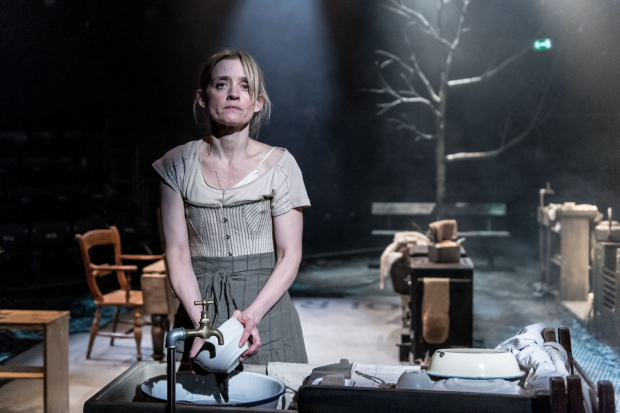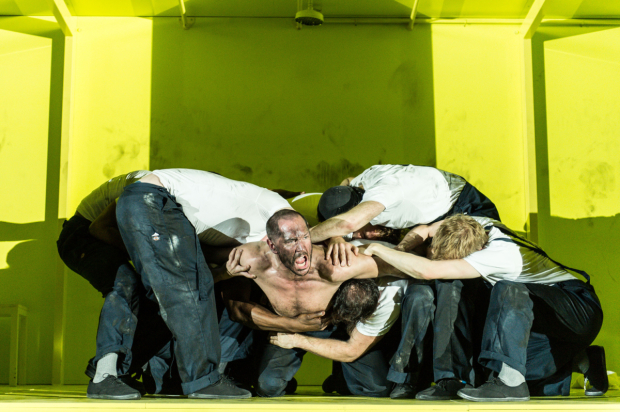Michael Coveney: Three is the magic theatrical number
Chief critic Michael Coveney discusses winning theatrical trilogies and ”The Hairy Ape”

© Manuel Harlan
Three is a magical number these days at the National Theatre. The opening of Waste in the Lyttelton completes an NT hat-trick of the major Harley Granville Barker plays in its history, while they are simultaneously interleaving the three best D H Lawrence mining community dramas in Husbands and Sons in the Dorfman.
And the revival of the predictably harsh As You Like It in the Olivier is the third NT version of the play, following the all-male flower power Clifford Williams production at the Old Vic in 1967 (Ronald Pickup as Rosalind, Anthony Hopkins as a very tawdry Audrey) and John Dexter's provocative pastoral in the Olivier in 1979, with Sara Kestelman as an effulgent Rosalind and Simon Callow as an unlikely Orlando.
Personally, I've not been mad about any of these As You's, preferring the recent brace of Rosalinds at Shakespeare's Globe – a saucy Michelle Terry, and Naomi Frederick, crop-haired and gamine at the court, gorgeously limber and proactive in brown leathers in the country.
It only goes to show that there is not any single way of doing these plays, and that every generation will think they are uncovering a dark and wintry side in Shakespearean comedy – Kenneth Branagh's Twelfth Night for his early Renaissance Company had as much snowfall as his current The Winter's Tale at the Garrick. But no-one has superseded the violence, misery and political nastiness of a German As You production I once saw in Dusseldorf, directed by the Georgian maestro Robert Sturua, famous director of the Rustaveli Theatre of Tbilisi who knocked Edinburgh and London us for six in 1980 with his vaudevillian, plangently scored Richard III led by the Olivier of the Caucasus, the late Ramaz Chkhikvadze.
The other two Granville Barkers at the National have been The Voysey Inheritance, twice (directed by Richard Eyre in the Cottesloe in 1989 and by Peter Gill in the Lyttelton in 2006), and The Madras House, directed by William Gaskill, with Paul Scofield, burnished and blazing as a sensual Mahommedan draper who believes that women only find fulfilment in satisfying men, in the Olivier in 1977.
Not only was Granville Barker – and who, by the way has decreed that his surname is now de-hyphenated? – a genius and a visionary as a practical theorist, actor and director, he was a notable feminist, part of the New Woman brigade led by Ibsen, William Archer and Bernard Shaw. But his plays are trapped in the time they are written. You can sit through Waste without understanding quite a lot of it, or at least missing the pertinence of its social and political commentary.
It was partly because the plays of D H Lawrence did not fit – indeed, they challenged – the prescriptive, drawing room, middle-class socialism of theatrical reformers from Shaw to Priestley that they remained unperformed for so long. And while I do feel something is lost in Ben Power's adaptation of the Lawrence trilogy, audiences at the National are reeling out of the Dorfman thunderstruck at the revelations and powerful writing, the sound of the first authentic working class voice on our stage, which is why he wasn't for so long.
Another remarkable staging I caught up with at the National was Sally Cookson's of Jane Eyre in the Lyttelton, although I was dreading it. The heart sinks at the sight of a rudimentary scaffolded set and a small folk band. But the acting carries us through. It's a great story, and the narrative is as well sustained as anything by Mike Alfreds's Shared Experience or Trevor Nunn and John Caird's Nicholas Nickleby.

(© Manuel Harlan)
How "new" is it, though? I'm reading the third volume of Simon Callow's brilliant Orson Welles biography— this particular trilogy will one day be a quartet; yes, there's a fourth volume to come – and he reminds us of Welles's 1955 production of Moby Dick at the Duke of York's, presented as a play-within-a-play on a bare stage, with no props, two decades ahead of its time. Kenneth Tynan described the show – which featured Welles himself as Ahab and Joan Plowright as the cabin boy – as "a sustained assault on the senses which dwarfs anything London has seen since the Great Fire."
Dwarfing most things in London at the moment is Richard Jones's production of Eugene O'Neill's The Hairy Ape at the Old Vic. Bertie Carvel is massive as the angrily repressed ship's stoker Yank, but it's the lighting, the amazing design by Stewart Laing, the stage composition of images and ensemble movement – the interpolated shower scene, the restrained mask work, the burst of Charleston, the "idea" of New York – that fair take your breath away.
Peter Stein brought a great production of the play to the National Theatre at Peter Hall and Thelma Holt's invitation – the set got stuck on opening night and we had a wonderful ninety-minute interval in the bar with Hall and Holt – but this, I think, tops it. And I could have claimed another trilogy had I fulfilled one of my student dreams, which was to direct the play myself the minute I read it. Instead, Jones has done it for me.












